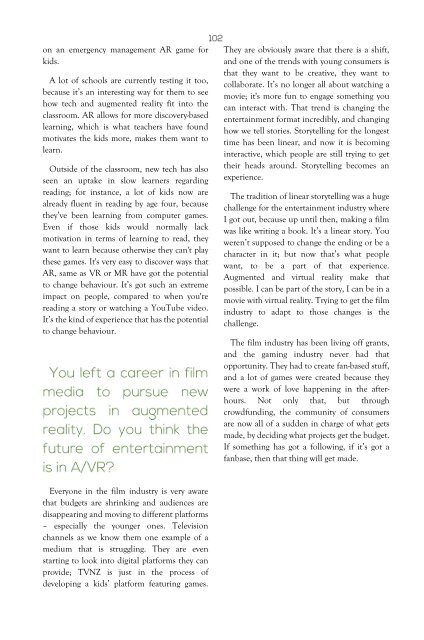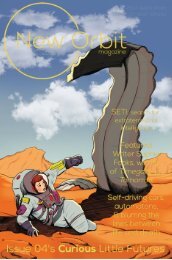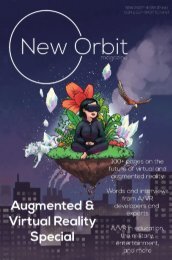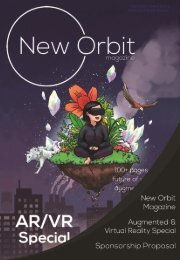Feb 2018 v01 online
((Incomplete formatting))
((Incomplete formatting))
You also want an ePaper? Increase the reach of your titles
YUMPU automatically turns print PDFs into web optimized ePapers that Google loves.
on an emergency management AR game for<br />
kids.<br />
A lot of schools are currently testing it too,<br />
because it’s an interesting way for them to see<br />
how tech and augmented reality fit into the<br />
classroom. AR allows for more discovery-based<br />
learning, which is what teachers have found<br />
motivates the kids more, makes them want to<br />
learn.<br />
Outside of the classroom, new tech has also<br />
seen an uptake in slow learners regarding<br />
reading; for instance, a lot of kids now are<br />
already fluent in reading by age four, because<br />
they’ve been learning from computer games.<br />
Even if those kids would normally lack<br />
motivation in terms of learning to read, they<br />
want to learn because otherwise they can't play<br />
these games. It's very easy to discover ways that<br />
AR, same as VR or MR have got the potential<br />
to change behaviour. It’s got such an extreme<br />
impact on people, compared to when you're<br />
reading a story or watching a YouTube video.<br />
It’s the kind of experience that has the potential<br />
to change behaviour.<br />
They are obviously aware that there is a shift,<br />
and one of the trends with young consumers is<br />
that they want to be creative, they want to<br />
collaborate. It’s no longer all about watching a<br />
movie; it's more fun to engage something you<br />
can interact with. That trend is changing the<br />
entertainment format incredibly, and changing<br />
how we tell stories. Storytelling for the longest<br />
time has been linear, and now it is becoming<br />
interactive, which people are still trying to get<br />
their heads around. Storytelling becomes an<br />
experience.<br />
The tradition of linear storytelling was a huge<br />
challenge for the entertainment industry where<br />
I got out, because up until then, making a film<br />
was like writing a book. It’s a linear story. You<br />
weren’t supposed to change the ending or be a<br />
character in it; but now that’s what people<br />
want, to be a part of that experience.<br />
Augmented and virtual reality make that<br />
possible. I can be part of the story, I can be in a<br />
movie with virtual reality. Trying to get the film<br />
industry to adapt to those changes is the<br />
challenge.<br />
The film industry has been living off grants,<br />
and the gaming industry never had that<br />
opportunity. They had to create fan-based stuff,<br />
and a lot of games were created because they<br />
were a work of love happening in the afterhours.<br />
Not only that, but through<br />
crowdfunding, the community of consumers<br />
are now all of a sudden in charge of what gets<br />
made, by deciding what projects get the budget.<br />
If something has got a following, if it’s got a<br />
fanbase, then that thing will get made.<br />
Everyone in the film industry is very aware<br />
that budgets are shrinking and audiences are<br />
disappearing and moving to different platforms<br />
– especially the younger ones. Television<br />
channels as we know them one example of a<br />
medium that is struggling. They are even<br />
starting to look into digital platforms they can<br />
provide; TVNZ is just in the process of<br />
developing a kids’ platform featuring games.










